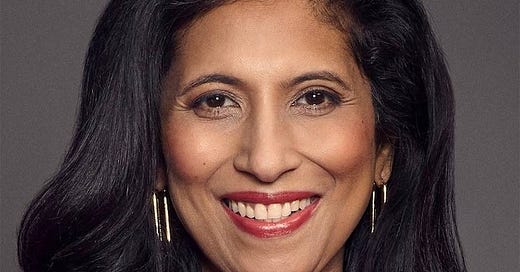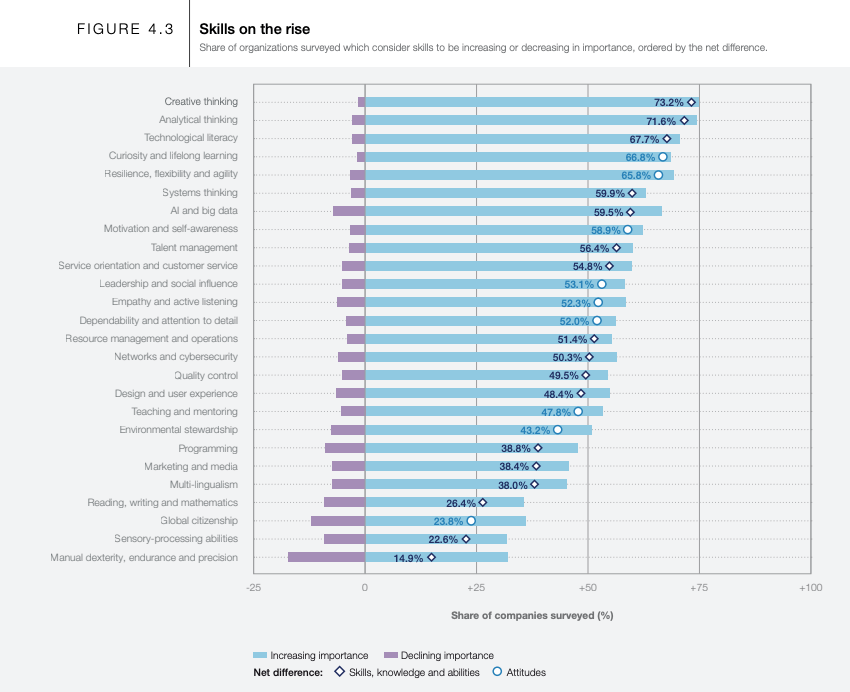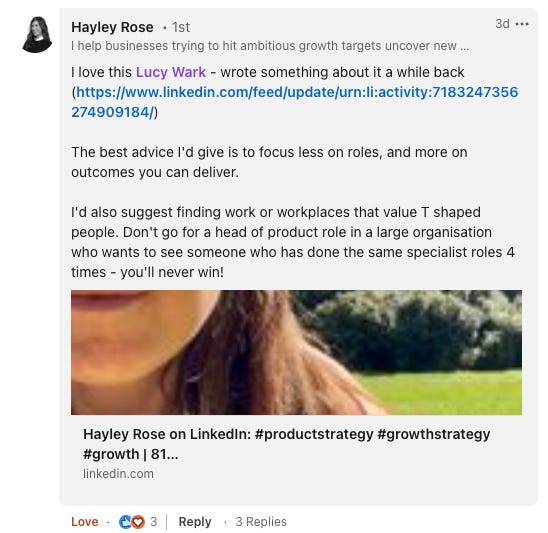👷 Career Strategy #6: Be A Generalist
Jack of all trades, master of none - or the perfect CEO?
Welcome back to Fuzzy’s Career Strategy Series, where we share research-backed strategies to help you realise your best career.
Part 1: 👋 Introducing the Career Strategy Series
Part 2: 🪜 Ladder Climbing as a Strategy
Part 3: 👩🎓 Controlled Supply as a Strategy
Part 5: 🔍 Niche-ing as a Strategy
Part 6: 🧱 Skill-stacking as a Strategy
Part 7: 👷 Be A Generalist as a Strategy
Part 8: 📊 The Portfolio Career as a Strategy
Part 9: 📣 Building a Platform as a Strategy
Part 10: 🌊 Wave-surfing as a Strategy
Part 11: 🏗️ Adding Leverage as a Strategy
Part 12: 🌏 Proximity as a Strategy
Part 13: ⏱️ Sequencing as a Strategy
Part 14: 🧪 Optimising for Discovery as a Strategy
Part 15: ⚡ Do What Gives You Energy as a Strategy
Part 16: 💹 Arbitrage as a Strategy
There are thousands of possible pathways for your career, but our research found there are ~10-15 dominant career strategies, which can be layered together if needed - and we’ll be breaking those down for you in this series.
"In the long history of humankind… those who learned to collaborate and improvise most effectively have prevailed."
Charles Darwin
👷 Introducing Strategy #6: Be A Generalist
Much of this series has focused on career strategies which exploit the benefits of specialisation, like niche-ing, controlled supply and skill-stacking.
So how can the opposite - being a generalist - also lead to success?
☝️ Defining a generalist.
What do you think of when you hear the word generalist?
Is it…
1️⃣ The jack of all trades?
One classic definition of a generalist is a ‘jack (or jill) of all trades’ a.k.a. someone who has a little bit of many different skills, but is a ‘master of none’.
But a shortcoming of this definition is that it tends to focus on the value generalists bring by executing specific tasks themselves.
2️⃣ Or the orchestra conductor?
Many people will challenge this ‘jack of all trades’ definition as minimising the value generalists bring to organisations.
They see a great generalist as more like an ‘orchestra conductor’ or dot-connector, who can see the big picture, learn quickly, anticipate problems and successfully coordinate many teams across silos to create a symphony.
You could see this kind of generalist as unlocking the potential value created by many different specialists in an organisation - rather than adding lots of small pieces of value themselves.
3️⃣ Or excellence that goes everywhere?
From a Fuzzy perspective, we think of generalists simply as:
People with highly transferable skills not bound to a specific context - with the ability to deploy into different industries, problems and functions.
They often excel in areas like communication, people management, problem solving, project management, self management & more.
Building these transferable skills is often the promise of grad programs in fields like management consulting or corporates - but they can also be “school of life” skills, acquired by spending time in fields like hospitality where you have to handle a wide range of people and operational issues.
Ultimately there’s no correct definition - but it’s worth considering how you define yourself and others when you use the term!
🗺️ Where generalists play best.
Feel like a generalist, but wondering where you should work?
Whatever definition you adopt, there are a few environments that generalists tend to perform best in👇
High heterogeneity of tasks i.e. not doing the same thing over and over, like a surgeon who focuses on one procedure
Cross-disciplinary work i.e. bringing together many perspectives to come up with a holistic solution e.g. marketing, growth and operations
High ambiguity i.e. frequently encountering novel challenges without textbook answers, which require thinking in a creative way
High resource leverage i.e. working in a large organisation where decisions are hard to reverse and there are big coordination challenges, so the ‘orchestra conductor’ can create lots of value
Skillsets needed > individuals available i.e. a team that can’t afford the luxury of all being specialists and people need to wear multiple hats, so the ‘jack of all trades’ can create lots of value
This speaks to an interesting paradox: some of most common careers for generalists fall at opposite ends of the scale spectrum 🤔
Founders & early hires in small organisations are often generalists, who can handle a high degree of uncertainty and execute to a ‘good enough’ standard across several areas until the organisation can afford to hire specialists.
But managers & leaders in large organisations are also often generalists - who know that once you reach a certain scale, the biggest problems are not technical ones but are about coordinating people, culture and decisions.
Another great way of looking at this is ‘structural hole theory’ - where each stage of an organisation’s growth (from 10 people to 100, 1000, 10000 and beyond) introduces a new ‘structural hole’ that can be filled by generalists.
We highly recommend this post from our friends at Generalist World - and all of their resources - if you’d like to dive deeper on this idea.
🔮 Generalist skills are the fastest-growing area of need globally.
The release of the World Economics Forum’s Future of Jobs Report is the equivalent of Christmas morning for career nerds like us 🎄
And the 2023 findings make for fascinating reading if you’re considering a generalist career…
Because the fastest-growing areas of skill are skewed heavily towards what we might call ‘generalist’ skills.
From creative and analytical thinking, to lifelong learning, resilience, systems thinking and even talent management…
These skills are not specific to an industry, field or function.
But they are essential to getting things done in a fast-changing world.
In other words - generalists actually might be the future of work.
And speaking of generalists who represent what modern careers can look like, we’d love to introduce you to the CEO of Chanel: Leena Nair.
🔍 Case study: Leena Nair
Leena Nair is the ultimate example of transferable skills.
In 2021, Leena Nair took the corporate world by surprise, when she was headhunted from being the first female, Asian and youngest ever Chief Human Resources Officer of Unilever, to become the CEO of iconic fashion brand Chanel - with no prior experience in fashion or luxury brands.
Nair originally studied engineering, but felt it wasn’t a good fit and went back to university to study a management degree. She said of the choice:
“When I told my dad I wanted to do an MBA in HR, he was so disappointed. ‘Why would you join a back-office function like personnel,’ he asked me.
But she persisted and joined Unilever, a global consumer goods company, in 1992 as a management trainee in India, rising through the ranks over decades.

After exposing herself to a range of roles across regions and functions, she eventually oversaw Unilever’s global workforce of over 150,000 employees as CHRO - becoming known for spearheading initiatives related to employee well-being, leadership development, and building an inclusive work culture.
When the opportunity of a CEO role came up, even Nair felt a sense of imposter syndrome.
So she called her mentor, the former CEO of PepsiCo Indra Nooyi.
“And I remember saying, ‘I don’t have this, I don’t have this network capability. I don’t have that capability.'”
Nooyi eventually asked:
“Do you know what you bring? Like, can you please list out everything you bring?”
So Nair began listing:
“I’ve been a global leader of a very large company [and so] understand [managing at] scale. I’ve run huge transformation programs. I’ve [managed] 150,000 people, I have been on very big mergers and investments”
And realised that by reframing her skillset in light of the role, she actually had many of the skills required of a modern global CEO already.
Reflecting on her conversation with her father later, she noted:
Today, I've gotten so relevant, because suddenly technology and people are coming together in today's world. People very quickly realise that digital transformation is about cultural transformation. So I'm geeky enough to understand the technology, and I know people enough to get cultural transformation – so that suddenly makes me indispensable! So I joke about it with people, that 26 years into my career, I have finally gotten relevant.”
Our (other) favourite career advice from Leena Nair 👇
"Careers are not ladders but jungle gyms. Be ready to move sideways, diagonally, and up to learn and grow."
"Be open to jumping into assignments which teach you the core of the business. Put your hand up for the jobs which are tough but will give you experience that others can’t match. I chose to work in three of our factories, stuck in the back of beyond with few buses or trains — something few trainees were willing to do.”
"Always think about how you can contribute, rather than focusing on your position or title."
“Create learning loops. You will never get it right the first time. So ensure you create learning loops- build, measure, learn, repeat”
🫣 How to overcome ‘generalist imposter syndrome’.
We recently posted about ‘generalist imposter syndrome’ on LinkedIn…
And it turns out, everyone feels it.
In fact, we saw such an overwhelming response that we want to share just a few favourite pieces of advice with you.
A massive thank you to Emma Earley, Harry Flett, Hayley Rose, Zezan Tam, Isaac Peiris and Mohana Prabhakar for these insights!
You can read the full post here - and we’d love you to add your ideas too! 💡
Found this post helpful?
We created this series to help everyone realise their best careers, and we’d love you to share it with your friends, family, colleagues and networks 📣
Keen for more? Check out the other posts in the series 👇
Part 1: 👋 Introducing the Career Strategy Series
Part 2: 🪜 Ladder Climbing as a Strategy
Part 3: 👩🎓 Controlled Supply as a Strategy
Part 5: 🔍 Niche-ing as a Strategy
Part 6: 🧱 Skill-stacking as a Strategy
Part 7: 👷 Be A Generalist as a Strategy
Part 8: 📊 The Portfolio Career as a Strategy
Part 9: 📣 Building a Platform as a Strategy
Part 10: 🌊 Wave-surfing as a Strategy
Part 11: 🏗️ Adding Leverage as a Strategy
Part 12: 🌏 Proximity as a Strategy
Part 13: ⏱️ Sequencing as a Strategy
Part 14: 🧪 Optimising for Discovery as a Strategy
Part 15: ⚡ Do What Gives You Energy as a Strategy
Part 16: 💹 Arbitrage as a Strategy















I've always been a generalist but it's taken me years to realise that it's a superpower. So happy that I now know that it's a massive strength!
I’m so inspired by this post. I’m a generalist and often find that it’s a barrier to progression. I’m not a teacher or a lawyer or a doctor etc etc. but what I can do is manage an organisations people, money, buildings, resources, programmes and performance. Exactly like you describe!!!
I became a chartered manager with the CMI (chartered management institute in the UK) for this very reason!